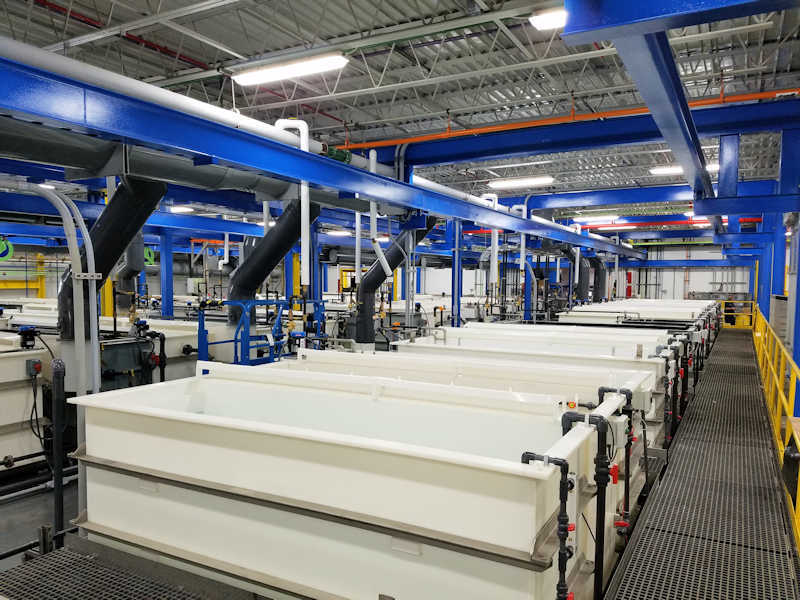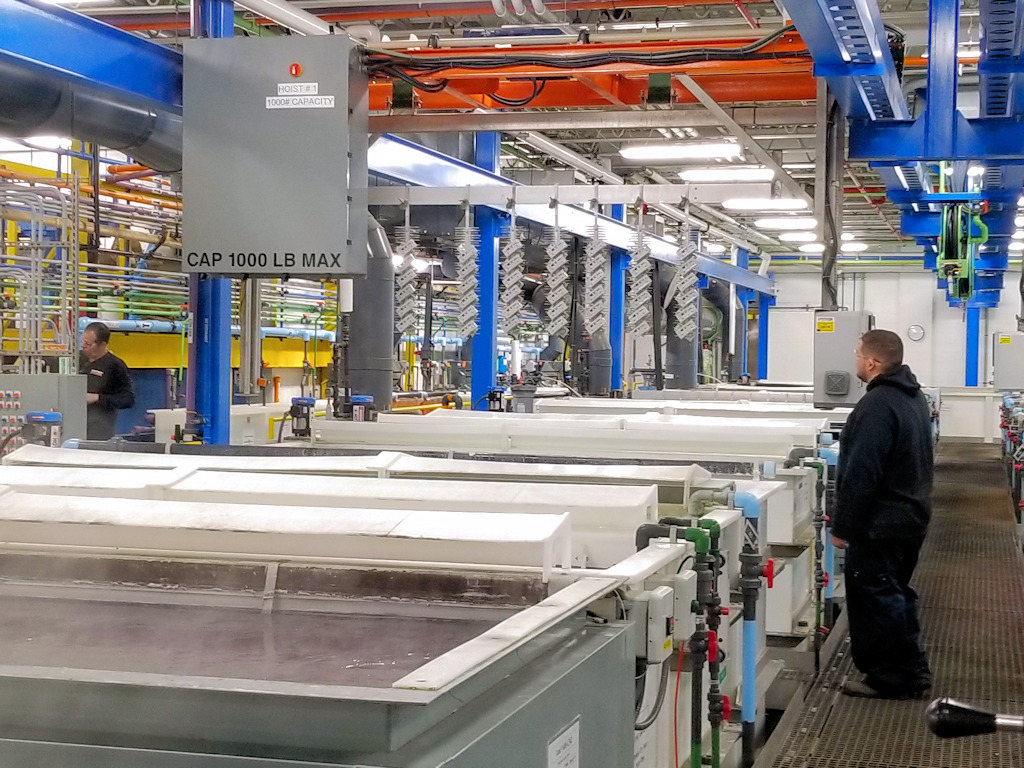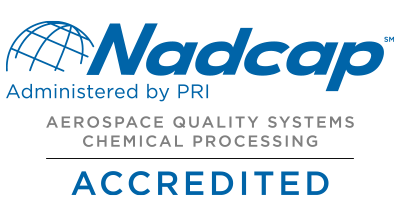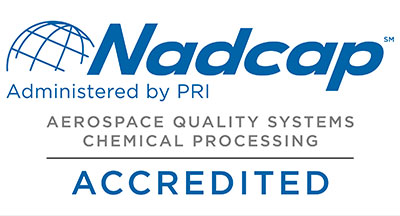What is Hardcoat Anodize?
Hardcoat Anodize or simply Hard Anodize is a dense anodic coating of aluminum oxide applied by converting a properly cleaned and deoxidized aluminum alloy component into an oxide film using a suitable electrolyte, typically sulfuric acid cooled to nearly freezing, and applied voltages upwards of 100 volts at an applied current density of 24-36 amps per square foot.
How is Hardcoat Anodize different than other types of anodize?
Aluminum anodizing is typically referred to by its three types. Type I is chromic acid anodize (or chromic alternatives) which are very thin on the order of 0.0001” thick. Type II is the conventional sulfuric acid anodize which can be decoratively dyed nearly any color and results in a thickness of 0.0002 – 0.0006”. Hardcoat Anodize is Type III which is done under more exacting process conditions resulting in a harder, denser, thicker, and more abrasion resistant coating. Hardcoat thicknesses can vary from 0.0005 to 0.0030” and beyond but is dependent on the specific alloy being anodized.
What are the attributes / characteristics of Hardcoat Anodize?
- Increased abrasion resistance (best when unsealed)
- Increased wear resistance
- Increased corrosion resistance (best when sealed)
- Improved aesthetics (see Appearance below)
- Dielectric properties (coating is an electrical insulator)
- Improved lubrication (particularly when PTFE sealed)
- Readily sterilized, non-contaminating (for medical instrumentation)
What’s the appearance of Hardcoat Anodize / MIL-A 8625 Type III?
Undyed, that is Class 1, hardcoat anodize will change the color of the aluminum dependent on the particular alloy and the anodic thickness. The color of the aluminum after being hard coat anodized depends on the alloy and the thickness of the coating. Many of the 6xxx-series of aluminum will take on a deep gray-black color while most 7xxx and 2xxx series will appear a more bronze-gray color. On some alloys, the color of the aluminum after hardcoat anodizing will be gray/bronze. For dyed Class 2 coatings, black is by far the most commonly specified and will take on a very pleasing, uniform appearance. Due to the dark nature of the undyed coating itself, other colors are not as decorative and uniform appearing. If a color other than black is needed, sampling is required prior to production.
How does Hardcoat Anodize affect dimensions of parts?
All anodizing is a conversion coating in that a portion of the base materials surface is converted from raw aluminum into aluminum oxide. In general terms, for Type III anodize ½ of the coating thickness penetrates into the surface of the parts while the other 1/2 builds up on the surface. Thus for a typical 0.002” thickness requirement, there is 0.001” dimensional change per surface. For any new parts, Anoplate makes sure that the required specifications are included in the ordering documents. When tight tolerances are required we’ll work closely with the customer to ensure that the thickness of the coating results in the needed final product dimensions.
Can certain surfaces be masked off so they are Hardcoat Anodized?
All 3 types of anodic coatings are electrical insulators so when an electrical grounding surface is required or in order to maintain close dimensional tolerances, surfaces can be readily masked such that those areas will remain anodize free. This can be done using simple rubber plugs, 3D printed silicone stop-offs, precision die cut custom decals, or painted on lacquer applied by hand or CNC programed robot. Anoplate prides itself in having in-house, state-of-the-art masking capabilities.
Should Hardcoat Anodize be sealed?
In general when hardcoat anodize is applied for wear or abrasion resistance, the coating is left unsealed (other than PTFE sealing) and this is the default in most specifications. If on the other hand, the primary purpose is corrosion resistance or a combination of corrosion and wear resistance, the hardcoat anodize should be sealed. In general, all dyed hardcoat anodize is required to be sealed in order to ensure the dye won’t fade or bleach out. Sealing can be accomplished using deionized water, sodium dichromate, nickel acetate, PTFE or a combination of two or more of these.
What are governing specifications that cover Hardcoat Anodize?
- MIL-A-8625, Type III
- AMS 2469
- ASTM B580, Type A
- ISO 10074
- MIL-A-63576 ( PTFE Sealed )
- AMS 2482 ( PTFE Sealed )
Hard Anodize Features:
- Improved wear resistance
- Non-conductive
- Can repair worn surfaces on aluminum
- Improve parts surface for slide applications
- Can be black dyed; other colors less decorative
- Finish is harder than tool steel
- Can be ground or lapped
Hard Anodize Applications:
- Valves
- Pistons
- Sliding Parts
- Hinge Mechanisms
- Cams
- Gears
- Swivel Joints
- Insulation Plates
- Blast Shields

Hardcoat Anodize Type 3 / MIL-A 8625 Type III at Anoplate
Anoplate has been supplying Hardcoat Anodize since 1971 beginning in a dry ice chilled tank as an Alcoa Alumilite licensee and then later a Sanford Process licensee. Nearly ½ a century later, Anoplate utilizes its own process controls and parameters to achieve results exceeding those required by the various specifications. Anoplate has further honed its Hardcoat Anodize expertise as a founding charter member of the International Hard Anodizing Association (www.ihanodizing.com). Two of Anoplate’s staff have served on the board of the IHAA and regularly attend their biennial technical symposiums.
 Anoplate has recently renovated its anodizing lines, including Hardcoat Anodize, in a modern, state-of-the-art facility. The new tank line includes 3 Hardcoat Anodize tanks, totaling 2,500 gallons, and 9,000 amps in rectification.
Anoplate has recently renovated its anodizing lines, including Hardcoat Anodize, in a modern, state-of-the-art facility. The new tank line includes 3 Hardcoat Anodize tanks, totaling 2,500 gallons, and 9,000 amps in rectification.
The largest parts we can accommodate are:
SIZE, Maximum: 110” L by 26” W by 39” D
WEIGHT, Maximum: 1,000 pounds
SURFACE AREA, Maximum: 83 square feet
What industries benefit from Hardcoat Anodize?
- Aerospace
- Automation / Robotics
- Automotive
- Electrical
- Food Manufacturing Equipment
- General Manufacturing
- Hydraulics / Pneumatics
- Machine Tools
- Medical
- Military / Defense
- Optical Devices
- Sporting Goods
For more information on any of our anodizing finishes or custom coatings, or to get started on selecting the right finishes for your project Contact Us Today.
Contact Us Online
(315) 471-6143














